Collagen shot Gaia Naturelle - clinically proven effects

We have already written a lot about our collagen and its effects in previous blogs, now we can confirm its effectiveness with the results of a clinical study.
Dietary supplements with collagen are probably the most popular dietary supplements on the world market at the moment. There are a lot of products out there that contain collagen with different active ingredients, and this makes it difficult for the end consumer to choose which collagen to take.
Collagen shot Gaia Naturelle - clinically proven to work
Until now, we have been able to justify the effectiveness of the Collagen Shot based on your opinions, but from now on we can confirm that the effects of the Collagen Shot are also clinically proven.
A randomized, double-blind, placebo-controlled clinical study has been carried out by an independent institute. The clinical study involved 107 women aged between 40 and 65 years. The study aimed to investigate the efficacy of our product in stimulating the synthesis of collagen and elastin fibers in the dermal layer of the skin.
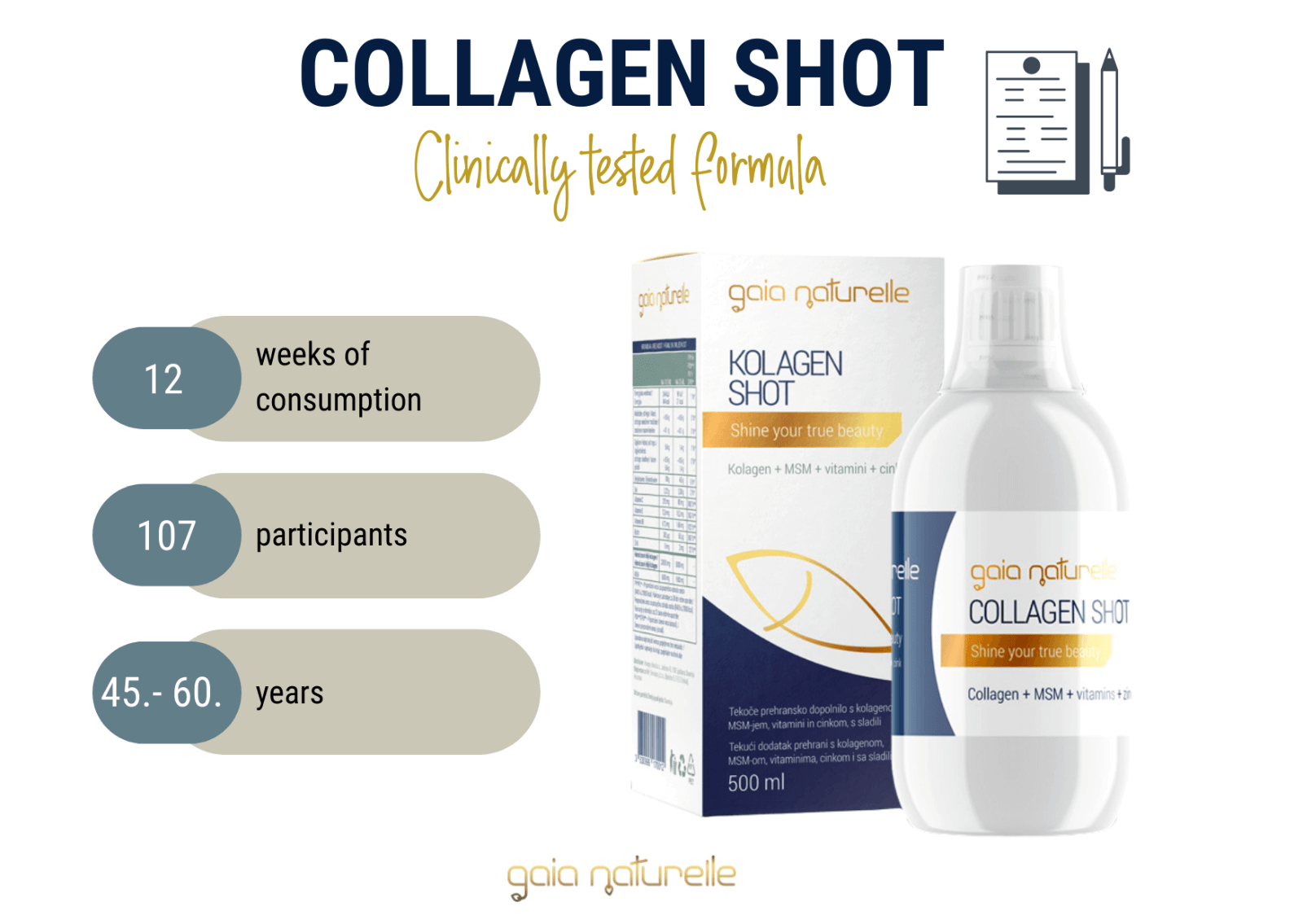
The clinical study examined a formulation with 5,000 mg of collagen peptides (hydrolyzed collagen) and 1,500 mg of MSM. Vitamin C (80 mg/25 ml) was also added to the formulation. The formulation was also sugar-free and in liquid form, ensuring convenience and ease of use.
The test group consumed the recommended daily dose of the test formulation (25 ml) for 12 weeks, while the placebo group consumed a liquid without active ingredients. The results of the groups were then compared to the baseline.
The synergy of collagen and MSM
Collagen is the most abundant protein in our body, accounting for between 25 and 30% of all proteins in the body. It is found in cartilage, skin, teeth, nails, muscle tendons, organ walls, and hair.
As we age, the body's collagen synthesis starts to decline. Signs of collagen deficiency are seen in poorer functioning of the musculoskeletal system, wrinkles and dry skin, brittle and brittle nails, and lack of shine in the hair.
Collagen peptides added to food supplements thus mimic the breakdown of the skin's collagen and trigger fibroblasts in the dermis to produce new collagen molecules.
The MSM molecule, a sulfur-rich component, plays a fundamental role in the synthesis of collagen, hyaluronic acid, and keratohyalin. Sulfur is the third most abundant mineral in the body, after calcium and phosphorus.
The human body contains 20 amino acids, but only 2 of the amino acids that make up the proteins in our bodies contain sulfur. These are:
Methionine - an essential amino acid (the body cannot synthesize it on its own)
Cysteine - a non-essential amino acid (the body can synthesize it, but needs sulfur from food to synthesize it)
Half of all the sulfur in the body is found in the skin, muscles, and bones. Sulfur is also an essential mineral in the production of collagen, the main component of cartilage and connective tissue. Together, they provide a synergistic effect that improves skin texture and reduces the number of wrinkles and fine lines.
Overview of results
After 12 weeks of consuming the formulation containing 5,000 mg of collagen peptides, 1,500 MSM, and vitamin C, the results showed:
20% improvement in dermis density
The dermis is the central, strongest, and thickest part of the skin, and plays one of the most important roles in protecting the skin from harmful external influences such as sun exposure or environmental pollution.
The key components of the dermis are collagen and elastin, which give the skin its strength and elasticity, which is why the density of the dermis is largely related to the amount of collagen and elastin. Around the age of 25, when the body's collagen synthesis starts to decline, the density of the dermis starts to decline at the same time. The loss of skin density is reflected in sagging, fine lines, and wrinkles.
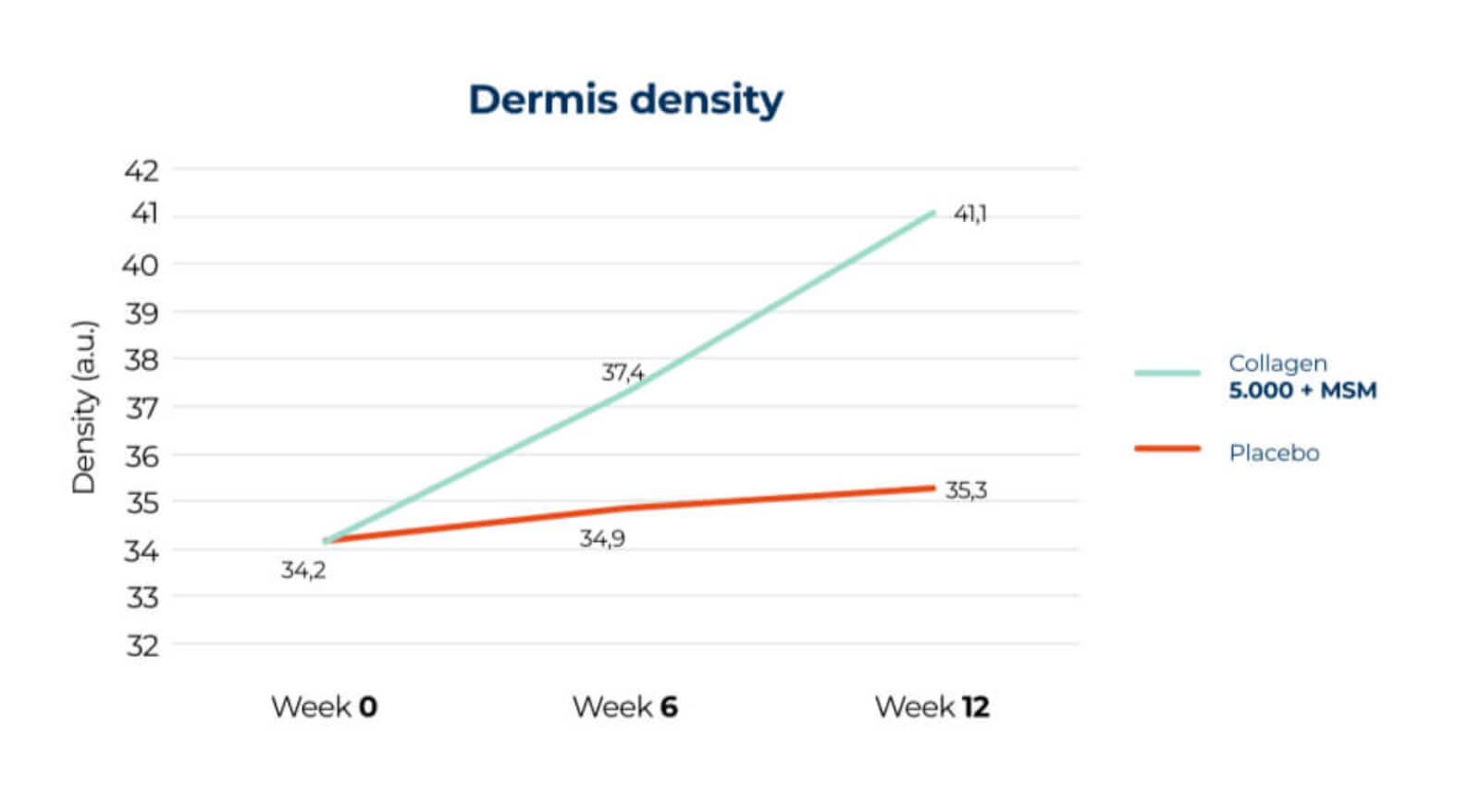 A clinical study showed a significant 20% improvement in dermis density using a combination of collagen and MSM.
A clinical study showed a significant 20% improvement in dermis density using a combination of collagen and MSM.
3.6% improvement in dermis thickness
The thickness of the dermis decreases with aging, which can cause a loss of skin elasticity. Genetics undoubtedly contributes to the problem of thin skin, but ultraviolet light (sun and tanning beds) has a greater impact on thinning our skin than genetics.
It is the free radicals produced by exposure to UV radiation that cause premature skin aging, known as photoaging. As well as damaging our DNA, they can also cause irreparable damage to the collagen structure, making the skin less elastic, thinner, and more wrinkled.
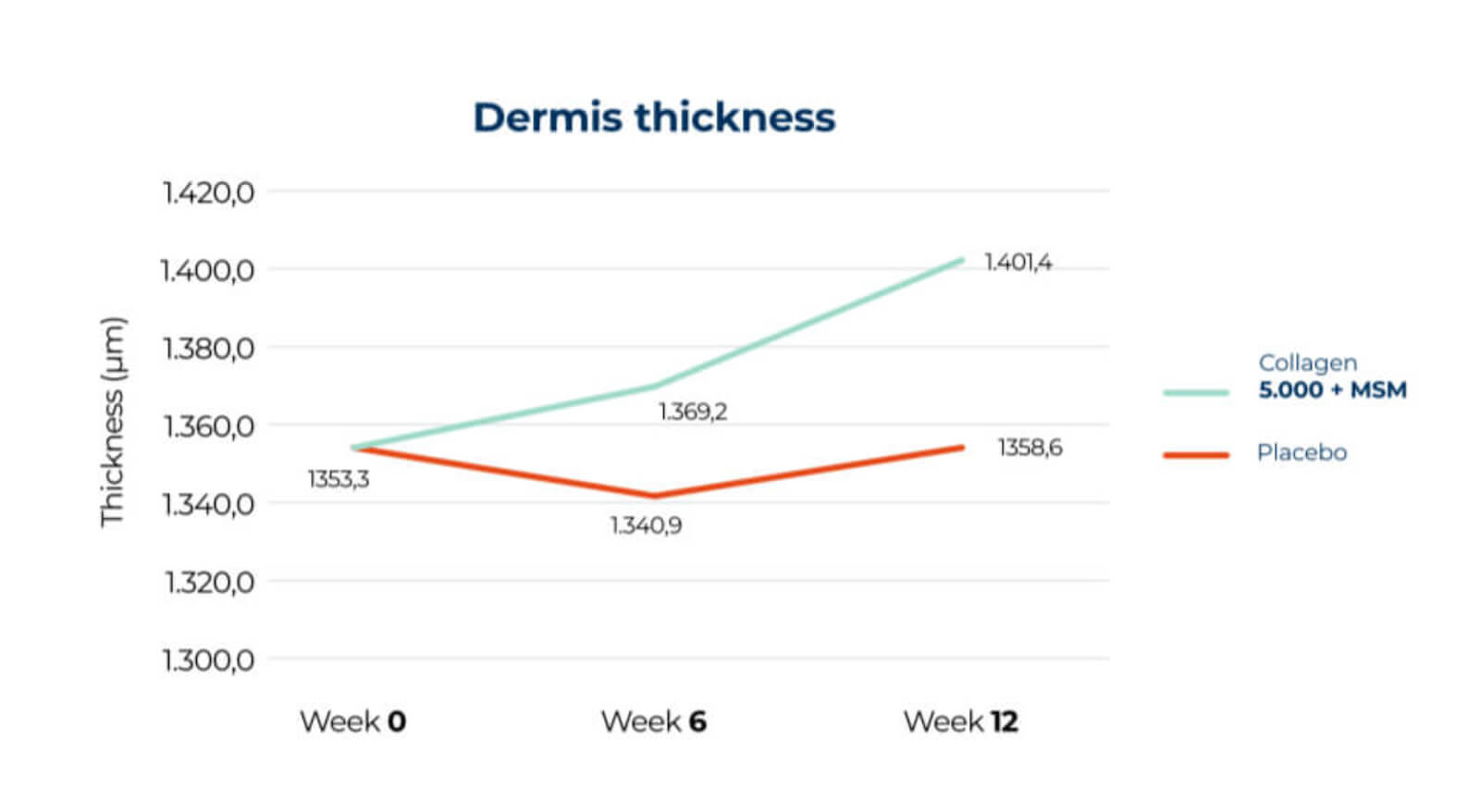 The loss of skin thickness due to regular exposure to light is one of the hardest things to reverse, so a 3.6% improvement in just 12 weeks is a significant achievement.
The loss of skin thickness due to regular exposure to light is one of the hardest things to reverse, so a 3.6% improvement in just 12 weeks is a significant achievement.
A 32% improvement in skin hydration
Hydration is the key to preventing the premature appearance of wrinkles. Your skin needs water to keep it firm and more elastic, in other words, to look healthy.
Hydrated skin already looks younger, with less sagging, a more even appearance, and firmer skin. But with hydrated skin, it's not just a question of aesthetics. Dry skin can also be dangerous. Poorly moisturized skin cannot properly maintain the skin barrier.
This makes it more vulnerable to harmful external influences. When the skin barrier is not effective, it can harbor bacteria, which can lead to infections.
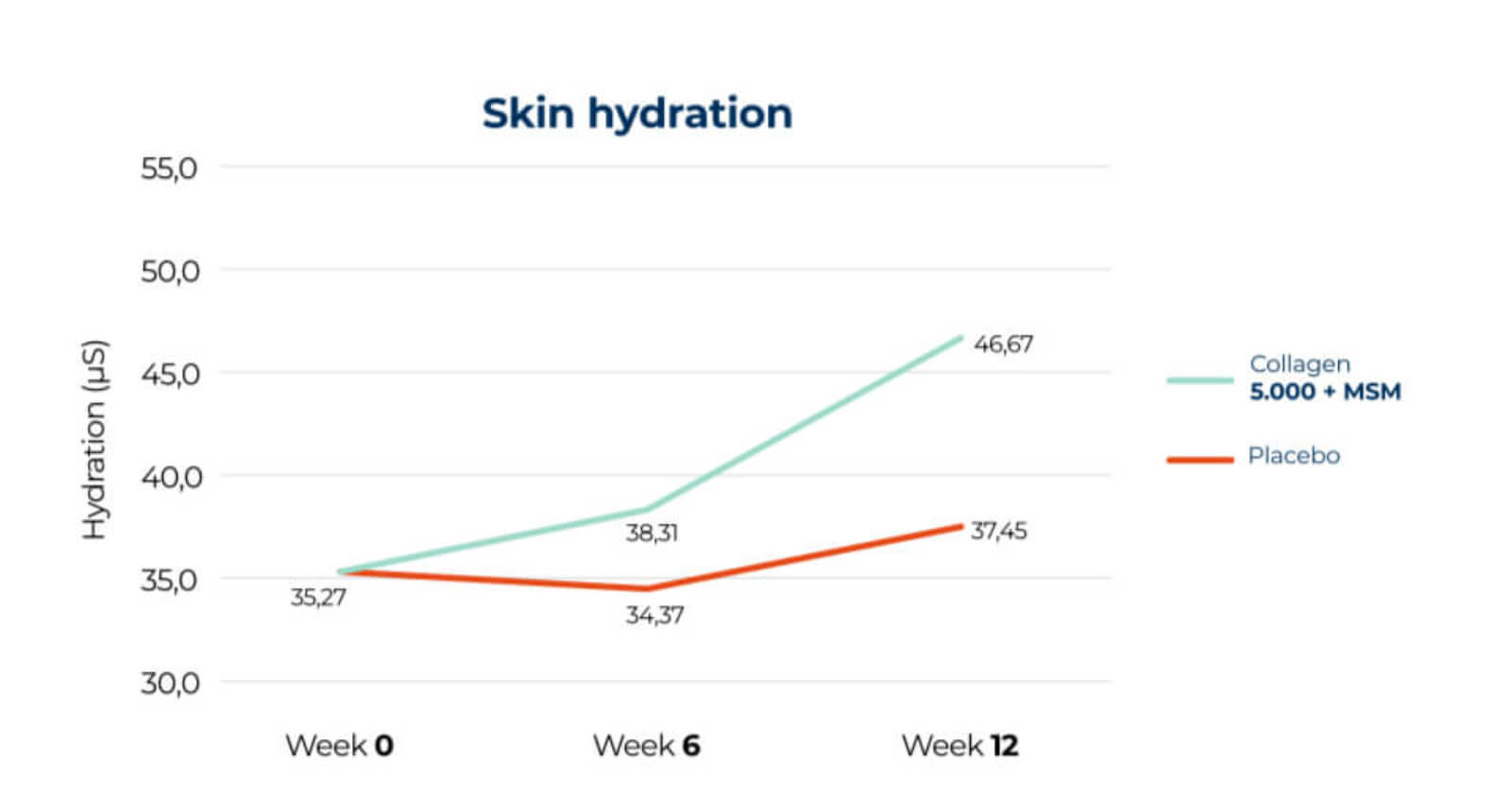
A study showed that collagen significantly increased skin hydration by 32% in just 12 weeks.
12% improvement in skin texture
Skin texture refers to the softness and evenness of the complexion. Good skin texture is when the complexion is smooth, soft, and pleasant to the touch. Conversely, a poorly textured complexion is rough and uneven in appearance, often with enlarged pores.
The study showed a significant 12% difference when using a combination of 5,000 mg of collagen and MSM compared to ''just'' the more concentrated collagen (10,000 mg).
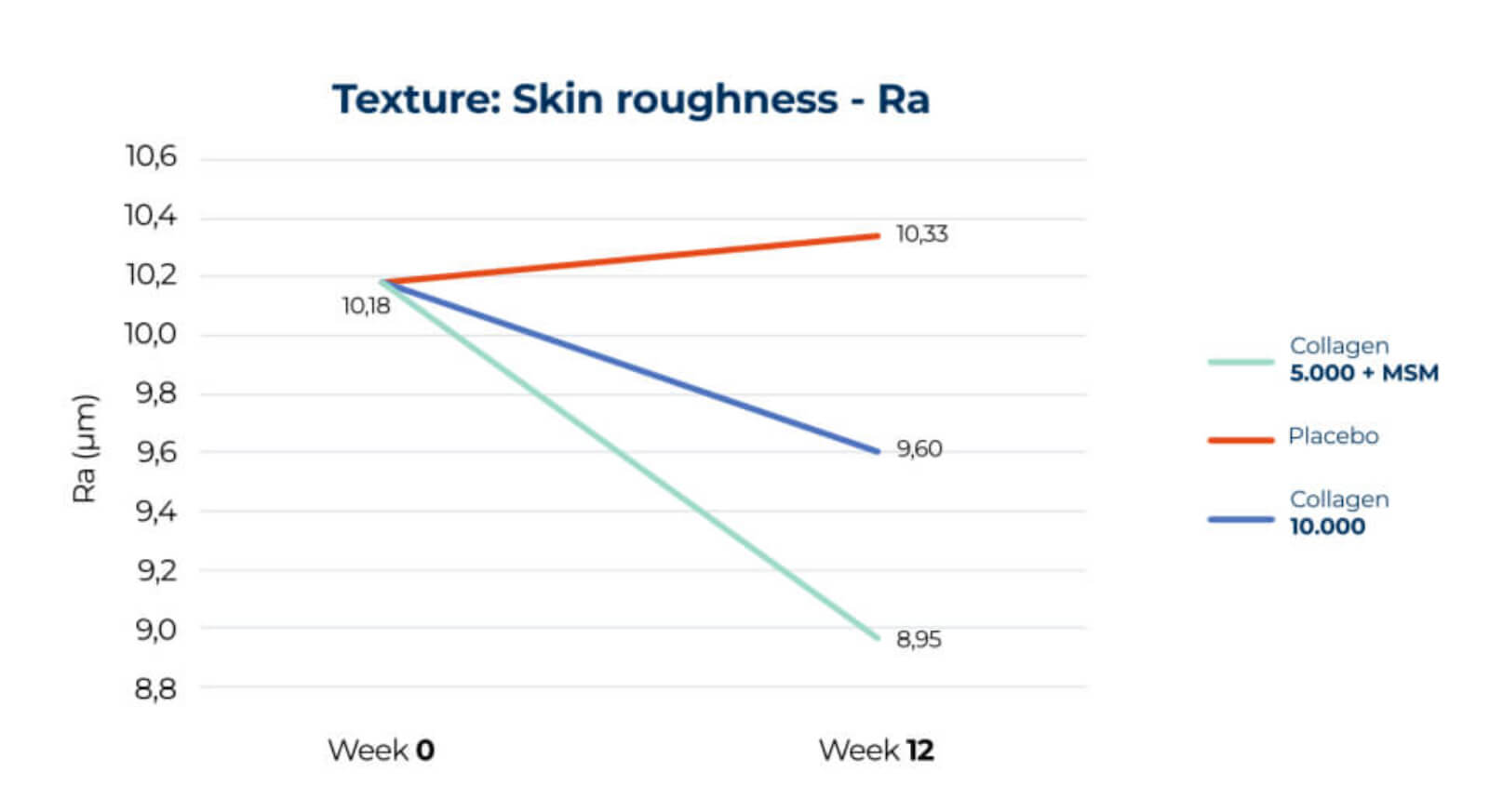
The addition of MSM in combination with collagen has thus been shown to improve skin roughness or texture.
14% reduction in wrinkle depth and 12% reduction in wrinkle volume
Wrinkles occur in thinner, less moisturized, and less elastic skin. As we age, we lose skin thickness and density, skin becomes less hydrated and elastic, and the natural process of wrinkle formation begins.
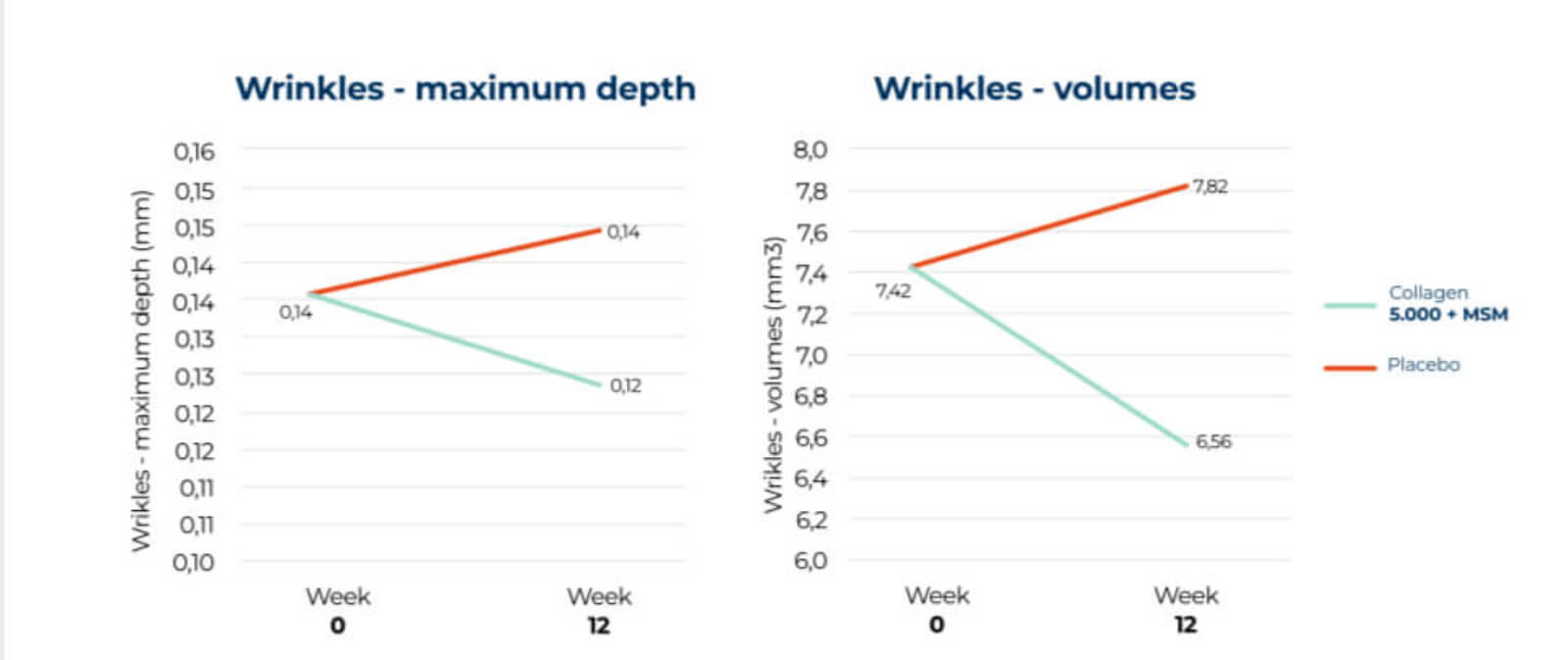
A study has shown that this process can be reversed by adding collagen. In fact, after 12 weeks, there was a 14% improvement in the maximum depth of wrinkles and a 12% improvement in the volume of wrinkles.



